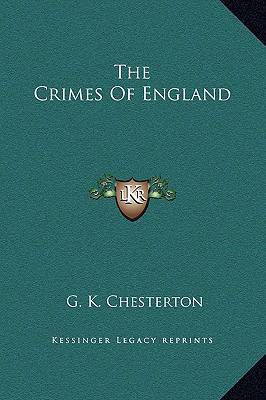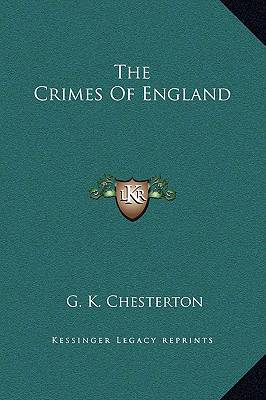
- Retrait gratuit dans votre magasin Club
- 7.000.000 titres dans notre catalogue
- Payer en toute sécurité
- Toujours un magasin près de chez vous
- Retrait gratuit dans votre magasin Club
- 7.000.0000 titres dans notre catalogue
- Payer en toute sécurité
- Toujours un magasin près de chez vous
Description
""The Crimes of England"" is a collection of essays written by G.K. Chesterton, a renowned English writer and philosopher, in which he criticizes the policies and actions of the British Empire. The book was first published in 1916, during the height of World War I, and Chesterton's arguments reflect his opposition to the war and his belief that Britain's imperialistic ambitions were causing more harm than good. Through a series of essays, Chesterton examines various aspects of British imperialism, including the treatment of Ireland, India, and Africa, as well as the country's involvement in the opium trade and the arms race. He argues that the British Empire is guilty of committing crimes against humanity, and that its policies are driven by greed and a desire for power rather than a genuine concern for the well-being of the people it governs. Chesterton's writing is characterized by his wit, his use of paradox, and his ability to challenge conventional wisdom. His arguments are often provocative and controversial, and he is not afraid to challenge the prevailing attitudes of his time. Despite the book's age, many of the issues it raises are still relevant today, making it a valuable read for anyone interested in the history of imperialism and its impact on the world.That great Englishman Charles Fox, who was as national as Nelson, went to his death with the firm conviction that England had made Napoleon. He did not mean, of course, that any other Italian gunner would have done just as well; but he did mean that by forcing the French back on their guns, as it were, we had made their chief gunner necessarily their chief citizen. Had the French Republic been left alone, it would probably have followed the example of most other ideal experiments; and praised peace along with progress and equality.This scarce antiquarian book is a facsimile reprint of the old original and may contain some imperfections such as library marks and notations. Because we believe this work is culturally important, we have made it available as part of our commitment for protecting, preserving, and promoting the world's literature in affordable, high quality, modern editions, that are true to their original work.
Spécifications
Parties prenantes
- Auteur(s) :
- Editeur:
Contenu
- Nombre de pages :
- 68
- Langue:
- Anglais
Caractéristiques
- EAN:
- 9781169218727
- Date de parution :
- 10-09-10
- Format:
- Livre relié
- Format numérique:
- Genaaid
- Dimensions :
- 178 mm x 254 mm
- Poids :
- 340 g

Les avis
Nous publions uniquement les avis qui respectent les conditions requises. Consultez nos conditions pour les avis.






